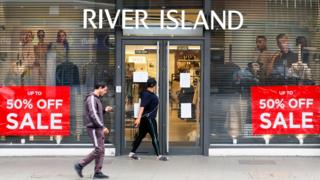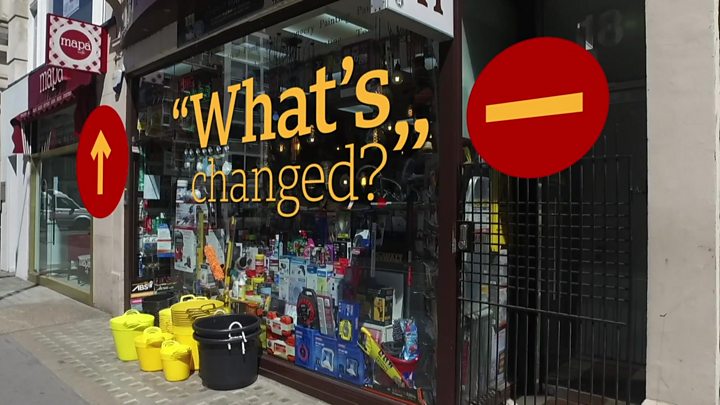 Image copyright
Getty Images
Image copyright
Getty Images
Non-essential shops can reopen in England from Monday, as lockdown restrictions are eased.
Similar retailers were allowed to reopen in Northern Ireland on Friday.
So, what can customers expect?
What sort of shops will reopen?
All shops in England selling what are called "non-essential" goods will be able to open.
This includes retailers offering clothes, toys, books and electronics - as well as record shops, tailors, auction houses, photography studios and indoor markets.
The government says they must meet Covid-19 guidelines to keep shoppers and workers safe.
Supermarkets, corner shops, banks, pharmacies and petrol stations were able to remain open during lockdown.
Garden centres reopened in England in mid-May, followed by open-air markets and car showrooms on 1 June.
When will hairdressers, cafes and pubs open?
In England, pubs, restaurants, hairdressers, hotels and cinemas won't be allowed to open their doors until 4 July at the earliest - and even then, only if they can meet social distancing measures.

Which High Street stores are reopening?
A number of big retailers have announced plans:
Some other retailers selling products classed as essential - such as DIY, furniture and bicycles - have also been reopening.
Furniture giant Ikea opened 19 of its stores across England and Northern Ireland recently, prompting long queues.
What about the rest of the UK?
In Northern Ireland, all shops are now allowed to open.
In Scotland, smaller shops and outdoor markets will be allowed to reopen in phase two of its lockdown-easing plan. First Minister Nicola Sturgeon says it's likely there will be more details on Thursday.
Wales's Economy Minister Ken Skates says he would like to see non-essential shops reopen the week of 22 June if coronavirus cases continue to fall.
How will shopping be different?
Perspex screens at the tills and floor markings to keep shoppers 2m (6ft) apart have already become a regular fixture in supermarkets. You are likely to see them in other shops too.
But some more unfamiliar measures - including pleas to not touch items unless you intend to buy - will be in place to try to reduce the virus spread.
John Lewis will clean baskets after each use. It will not let customers use fitting rooms, and services such as personal styling, the bureau de change and food and drink outlets will be closed.
Marks & Spencer will also not be offering all of its services. The bra fitting service will not be available, for example.
All the staff at Next will wear plastic visors, with the option to also wear masks if they want to.
Waterstones says it will quarantine books for 72 hours after people have touched them.
Can I shop with friends?
Stores have been asked to encourage people to shop alone.
Big retailers have been urged to talk to local authorities about providing extra parking and bike racks where possible, to stop people using public transport.
The number of customers in stores will be limited, while shopping centres have been told they are responsible for controlling queues in common areas outside stores.
Will it be busy?
It may take time for customers to return to their old shopping habits.
The British Retail Consortium estimates that the lockdown is costing non-essential retailers £1.8bn a week in lost sales.
"Many retailers will be anxious to see whether demand returns to our High Streets," says the BRC's chief executive, Helen Dickinson.
The British Independent Retailers Association's chief executive, Andrew Goodacre, is also wary - believing fewer people than before will go shopping and they may "soon become weary of queuing".
With many people fearful for their jobs, now may not be the time to splurge on the High Street - but there may be bargains.
Clothing retailers went into lockdown just after stocking up with spring and summer ranges, which they now need to shift.